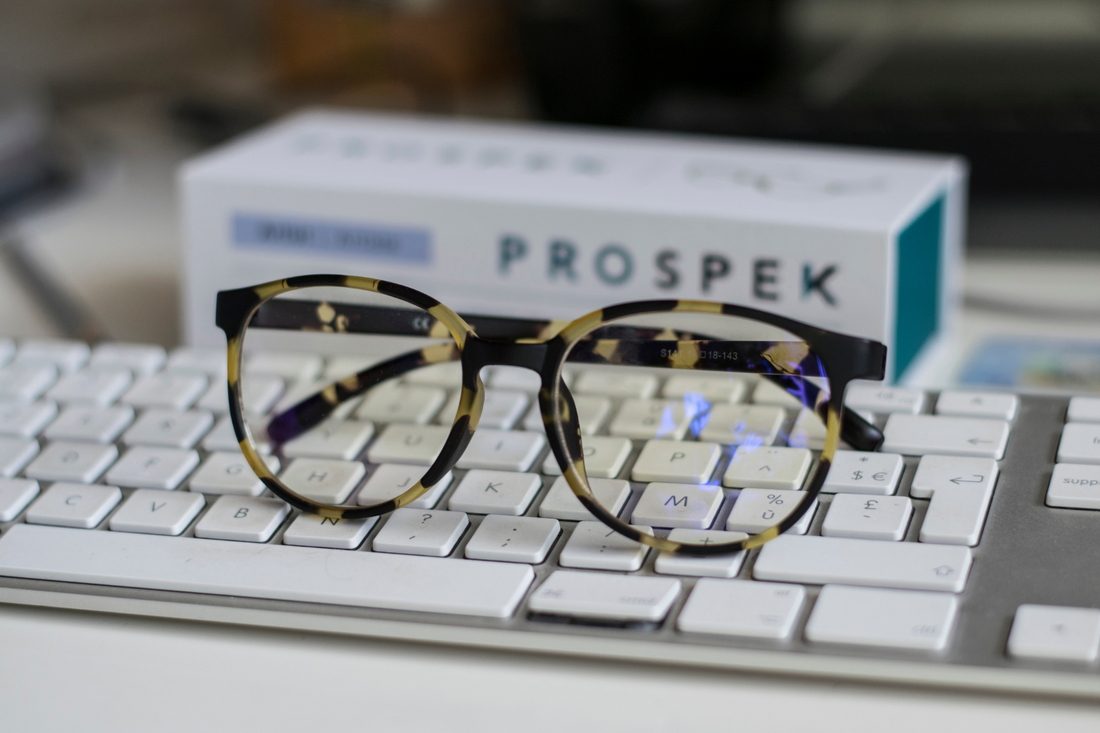
Spektrum Glasses and My Experience Using Them
How much time do you spend looking at a screen? Computer time, tablet time, smart phone time, tv time—I’m guessing it all adds up to a lot. Did you know that these screens emit a wavelength of light called blue light, and that this light can disrupt your sleep/wake cycles and potentially contribute to chronic illness and disease? Even if you limit your screen time, our energy-efficient LED bulbs and compact fluorescent lamps (CFLs) radiate more blue light than the older incandescent bulbs.
Blue Light Blocking Glasses
Light affects our circadian rhythms, hormone secretion, body temperature, heart rate, and even gene expression. Furthermore, blue light has been found to have more powerful effects than other wavelengths of light. When subjects were exposed to 6.5 hours of blue light versus green light of comparable brightness, Harvard researchers found that their circadian rhythms shifted by double the amount (3 hours vs. 1.5 hours). Blue light has also been shown to be linked to the eye disease macular degeneration and to eye strain.
Too Much Light Stimulus
The Vision Council recently found that “nearly 95 percent of Americans spend two or more hours every day on digital devices.” How many of you thought, “Just two or more hours?” My thought is that the number of hours is much higher than that. I know I spend a lot of time on my computer, looking up information, writing about health topics, and creating health treatment plans for my patients. I also spend my fair share of time watching Netflix, checking out the Facebook shares of friends, and yes, watching silly videos (mostly dog ones though, not as many of those proverbial cat videos).
The worst time to do all that? In the evening, in the last few hours before bedtime. Doing so suppresses your melatonin production, an important hormone that regulates your circadian rhythm schedules. Melatonin is also a powerful antioxidant that helps protect your body against cellular damage.
I often advise my patients to shut off their tvs, smart phones, tablets, and computers at least an hour before bedtime. But really, they should be shut down a few hours before lights out. In addition, it’s wise to reduce the amount of light around you, in general, as you wind down for the night.
A Solution
I get it, there are numerous excuses why you don’t want to turn off those devices in the evening. You have work you have to get done. You work best at night. It’s your way to wind down at the end of a busy day. You want to catch up on the news. And so on.
That’s why, when I saw a possible solution at a health show I was attending, I was intrigued. Spektrum glasses reduce the amount of blue light that enters our eyes. There are four options.
- 97% reduction of blue light glasses
- 40% reduction of blue light glasses
- 97% reduction of blue light clip-ons for glasses
- 40% reduction of blue light clip-ons for glasses
The glasses and clip-ons that reduce 97% of blue light are orange/yellow tinted, so they stand out, but I don’t mind standing out. Plus, those ones are most useful for evening use. The 40% glasses and clip-ons don’t have much orange tint, and are especially suited to daytime use and to watching movies or looking at things that you want to see in true colour, not yellow-tinted.
I don’t normally wear glasses, so I tried both the 97% and 40% glasses. My husband is a contract content marketer, i.e. writer, so he’s on his computer all day. He tried alternating between the glasses and the clip-ons.
Our Experience with Blue Light Glasses
When using the stronger tinted glasses, I found it particularly important to make sure I had strong enough lighting, but otherwise I found those were my preferred glasses. I find myself at my most creative—a good time for writing—in the evening. But I knew that the one hour before bed computer shut down timing was not good enough.
As a doctor of Traditional Chinese Medicine, I am passionate about my recommendations for preventing illness and disease, not just treating it. I believe in the “do as I say AND as I do” principle. I also like the idea of being able to have my cake and eat it too. So, for me, the glasses are an excellent tool I can use to keep my patients (and me) healthy, while still allowing us to have some evening screen time.
For my husband, he prefers the 40% glasses and clip-ons. Since he started writing, his computer time has increased significantly. And with that has come eye strain, dry eyes, and headaches. Starting the very first day he began using the Spektrum blue light glasses, he noticed a considerable improvement in his eyes and his headaches.
Neither of us has issues with sleep, but that’s another major reason why you might want to consider doing something to reduce your blue light evening exposure.
While there are a number of reasons why limiting your screen time is a good idea, at least one troubling issue can be easily managed, so if you see me wearing orange-tinted glasses, I’m not wearing them just to look cool.
About the Author
Dr. Melissa Carr is a registered Doctor of Traditional Chinese Medicine and acupuncturist with a B.Sc. in Kinesiology. In addition to treating patients in an integrative medicine clinic, Dr. Carr is also a natural health and nutrition consultant, lecturer, and writer. Believing that her role is as guide, teacher, and motivator, her goal is to work in partnership with her patients to bring them to their optimal health.
http://www.ncbi.nlm.nih.gov/pmc/articles/PMC2831986/
http://www.reviewofoptometry.com/continuing_education/tabviewtest/lessonid/109744/
